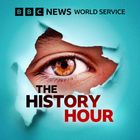
The History Hour
Jun 14, 2024
Max Pearson presents a collection of this week’s Witness History episodes from the BBC World Service.
First, we hear about Boko Haram militants driving into Gwoza in north-east Nigeria in 2014, to begin an assault which left hundreds dead.
Next, the Irish shopworkers who went on strike after refusing to handle South African goods.
Then, it’s 25 years since Nato bombed the Serbian state TV station in Belgrade.
Plus, Norway’s biggest industrial disaster.
And, Brazil’s iconic egg-shaped telephone booth.
Contributors:
Ruoyah who lived through the Boko Haram massacre.
Makena Micheni - Associate Lecturer at St Andrews University.
Irish shopworker Mary Manning.
TV technician Dragan Šuković.
Harry Vike and his wife Greta.
Chu Ming Silveira’s son Alan Chu.
(Photo: A woman from Gwoza displaced by the violence. Credit: Reuters/Stringer)

